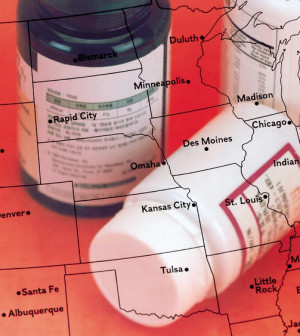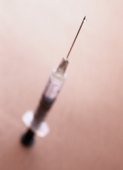- Double Mastectomy May Offer No Survival Benefit to Women With Breast Cancer
- Toxic Lead Found in Cinnamon Product, FDA Says
- Certain Abbott Blood Sugar Monitors May Give Incorrect Readings
- Athletes Can Expect High Ozone, Pollen Counts for Paris Olympics
- Fake Oxycontin Pills Widespread and Potentially Deadly: Report
- Shingles Vaccine Could Lower Dementia Risk
- Your Odds for Accidental Gun Death Rise Greatly in Certain States
- Kids From Poorer Families Less Likely to Survive Cancer
- Tough Workouts Won’t Trigger Cardiac Arrest in Folks With Long QT Syndrome
- At-Home Colon Cancer Test Can Save Lives
Dengue Fever Vaccine Shows Some Promise in Trial


A potential vaccine to protect children from the worldwide scourge of dengue fever was somewhat successful in a trial among Asian children.
While the vaccine only prevented dengue fever in 56 percent of the 10,000 kids who got the full series of three shots, it protected more than 88 percent of them from severe disease. In the worst-case scenarios, dengue fever can lead to hospitalization, and sometimes death.
“This vaccine has already proven to be safe,” said Tyler Sharp, an epidemiologist in the dengue branch of the U.S. Centers for Disease Control and Prevention, who had no role in the trial. “We know that this vaccine does not lead to a risk of developing severe dengue — that is a huge step forward.”
However, “the 56 percent is not as high as we would like to see it. It’s still a big step forward, but we have a way to go before we get a vaccine that is both safe and as efficacious as we would need it to be,” Sharp added.
Of the 400 million people infected worldwide every year, about half have mild symptoms such as fever and body pain that goes away in a couple of days, Sharp said. But the other half have intense pain, severe headaches and high fever, and some may have minor bleeding under the skin, or from the gums or nose, he added. There is no treatment for dengue.
In the United States, dengue is endemic in Puerto Rico, the U.S. Virgin Islands and the U.S. territories in the Pacific Ocean, Sharp said. Although isolated cases of the mosquito-borne disease have cropped up in Florida and Texas in recent years, Sharp said he did not expect the disease to gain a foothold in the continental United States.
Dr. Annelies Wilder-Smith, a professor of infectious diseases research at the Lee Kong Chian School of Medicine at Nanyang Technological University in Singapore, stressed that a more effective vaccine is needed.
“Of course, our desire is to have a vaccine efficacy of above 90 percent,” she noted.
Wilder-Smith, who authored an accompanying journal editorial, noted that other dengue vaccines are being tested, but it will take several years before those vaccines reach phase 3 trials.
“For the time being, this is the best and the only one we have,” she said of the current vaccine, known as CYD-TDV.
The report, from scientists at the Research Institute for Tropical Medicine in the Philippines, was published online July 11 in The Lancet.
Dr. Marcelo Laufer, an infectious diseases specialist at Miami Children’s Hospital, said he was “not impressed” by the efficacy of the vaccine.
Laufer also noted that the vaccine needs to be tested in other areas, particularly in Latin America, and that patients need to be followed for at least five years.
“I am curious to see how the vaccine would work in different populations,” he said.
The trial, funded by vaccine maker Sanofi Pasteur, focused on children aged 2 to 14. They were randomly assigned to receive three injections of the CYD-TDV vaccine or a placebo vaccine.
After the first vaccination, the second was given six months later and the third six months after that. The children were followed for up to two years.
More than 28 days after the third vaccination, 117 children who received the vaccine developed dengue, compared with 133 who were given placebo. That works out to a vaccine effectiveness rate of 56.5 percent, the researchers noted.
In addition, after three doses, the vaccine was 88.5 percent effective against severe disease, which often leads to hospitalization for over 500,000 people — mostly children — every year.
“One of the difficulties in making a dengue vaccine is that you have to cover for four different viruses at the same time,” Sharp explained. “If you are not able to do that, you risk increasing the chances of developing severe dengue.”
The vaccine wasn’t equally effective against all four dengue viruses. It was only 35 percent effective against type 2, more than 75 percent effective against types 3 and 4, and 50 percent effective against type 1.
The vaccine was well tolerated, the researchers reported. A total of 402 serious adverse events were reported in the vaccine group and 245 were reported in the placebo group.
More information
For more on dengue fever, visit the U.S. Centers for Disease Control and Prevention.
Source: HealthDay
Copyright © 2024 HealthDay. All rights reserved.










